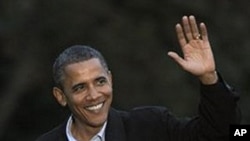President Barack Obama met with Democratic Party leaders in the U.S. Congress on Thursday as lawmakers left Washington to campaign for November 2 mid-term congressional elections. The discussions centered on the post-election agenda and the outlook for Democrats who face the possibility of losing majority control of the House of Representatives and the Senate.
The meeting came as the House, where Democrats hold a strong majority, formally adjourned so lawmakers can return to their districts to campaign during the few weeks before the elections.
Adjournment of the House, and Senate, left unfinished one of President Obama's major goals - action on expiring income tax cuts - a subject of intense debate across the nation. That and other issues will be left to a so-called "lame duck" session in mid-November - the last meeting of the Congress before new members take office in January.
For Democrats, loss of the House or the Senate would be a major blow to their ability to pass legislation, although President Obama already has had great difficulty pursuing his legislative agenda due to Republican opposition in the Senate.
Democratic leaders said nothing to reporters at the White House after meeting with Mr. Obama on Thursday. But later on Capitol Hill, they listed accomplishments, including health care system reform, which Republicans vow to repeal, if they win control of Congress, and financial system reform.
House Majority Leader Steny Hoyer compared progress under the Democrats and President Obama with that under Republican President George W. Bush.
"Our record on behalf of working families contrasts sharply with the Republicans' plan to deliver - and, I quote, the exact same agenda of the failed Bush years, which exploded the deficit, devastated working Americans and ushered in the worst economy we have seen since [Republican] Herbert Hoover," he said.
Meanwhile, House Minority Leader John Boehner delivered a speech, asserting that Congress had become dysfunctional. He proposed rule changes to make it easier for lawmakers to reduce federal spending.
"The House finds itself in a state of emergency," he said. "The institution does not function, does not deliberate, and seems incapable of acting on the will of the American people."
House Speaker Nancy Pelosi derided Boehner on the issue, saying that he and the Republicans had presided over a near doubling of the U.S. national debt before Democrats won control of Congress in 2006.
"It is no wonder that Mr. Boehner wants to talk about process," she said. "They have no substantive issues to take to the American people."
At the White House news briefing, Press Secretary Robert Gibbs responded to a question about why Congress was unable to pass government spending bills during its regular session. He attributed much of the problem to Republican opposition in the Senate, where a 60-vote majority is required to pass legislation.
"That's just the way it is," he said. "It's not the way that place should run. It's not what the American people want to see. But it's the way Republicans have acted on Capitol Hill for the entirety of the president's time here in Washington."
As members of Congress of both parties return home to campaign for the November elections, they face opinion surveys showing that most Americans do not think highly of how they are doing their jobs - a trend, analysts say, that is not likely to change anytime soon.




